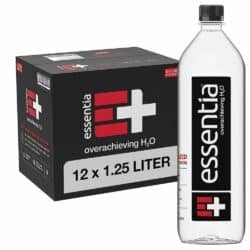Is Dasani Water Bad For You (From a Nutritionist)?
In this blog post, I’ll review whether Dasani Water is bad for you or not? Find out what this product’s nutrition pros and cons are and if there are better options to consider. For most people, drinking Dasani bottled water is likely not harmful and can help with hydration.

Dasani Water Facts
Dasani Water is an American-based bottled water brand launched in 1999 by the Coca-Cola Company. It is one of many brands that make up the bottled water industry in the United States and abroad.
The product is filtered and bottled using water from municipal water systems or, in some cases, from protected groundwater sources managed by the bottling plant with approval from the local authorities.
The Dasani Water website describes it as purified and enhanced water containing a blend of minerals that give it a fresh and clean taste. The product contains zero calories, is sugar-free, and is packaged in a 100% recyclable bottle that can be refilled, reused, or recycled.
The Dasani bottled water purification process involves a few steps: removing any volatile organic compounds and chlorine by passing the water through activated carbon filtration.
It then goes through a reverse osmosis process followed by interim ultraviolet light disinfection, which destroys micro-organisms and harmful contaminants and ensures water safety and purity before tiny amounts of potassium chloride, salt, and magnesium sulfate are added to provide a consistent taste.
The final step involves pumping ozone gas through the water to purify and disinfect the water.
Dasani Water is available in 10.1 fl oz, 12 fl oz, 16 fl oz, 20 fl oz, 1 liter, or 1.5 liters sizes. It is marketed to adults as a lifestyle brand.
The only ingredients in Dasani Water are purified water, magnesium sulfate, potassium chloride, and salt added for taste.
You might also like my Fresca Water review which is another product made by the same company.
Dasani Water Ingredients
Let’s examine the main ingredients in Dasani Water and their implications for your health. That way, you can then decide if it’s healthy or not for you and your family.
The mineral quantities in Dasani Water are within the permissible limits of the regulatory authorities including the Food and Drug Administration and are not considered harmful to human health.
Purified Water
Consuming purified water in bottled water typically doesn’t pose significant health problems, as purified water undergoes extensive filtration processes to remove impurities and contaminants.
However, if the manufacturer does not adequately monitor the purification process or contaminants are introduced during bottling, there is a risk of bacterial or chemical contamination.
Coca-Cola Company states on its website that processing meets the standards for bottled water.
Potassium Chloride
The potassium chloride content in Dasani Water is relatively low, and this ingredient is generally not considered unhealthy. However, consuming excessive potassium chloride can lead to various health concerns.
While potassium chloride is commonly used as a salt substitute for those with high blood pressure or heart conditions, excessive intake can disrupt the balance of electrolytes in the body.
When this happens, it can lead to hyperkalemia, which can cause irregular heartbeats and muscle weakness. It may even lead to cardiac arrest in severe cases.
Magnesium Sulfate
Another main ingredient in Dasani Water is magnesium sulfate.
Consuming magnesium sulfate in high amounts can pose several health risks. Overdosing on magnesium sulfate can cause symptoms such as nausea, vomiting, diarrhea, and abdominal cramps. In severe cases, it can result in dangerously low blood pressure and respiratory depression and may even lead to cardiac arrest.
Individuals with kidney problems or heart conditions should be particularly cautious when using magnesium sulfate, as it can exacerbate these conditions. The amounts of magnesium sulfate in Dasani Water are relatively low and considered safe to consume in moderation.
Consuming one bottle of water per day should not pose a health risk for most people.
Salt
Salt can harm individuals sensitive to sodium or those with certain medical conditions like high blood pressure or heart disease. Since Dasani Water’s sodium level is 0mg, it will likely not pose any health risks.
While Dasani Water contains safe amounts of salt added to bottled water for taste enhancement and electrolyte balance, excessive salt intake can elevate blood pressure, cause dehydration and water retention, and increase the risk of cardiovascular disease.
Nutrition Pros
Dasani Water is a convenient way to stay hydrated and is a popular choice. It is available in different bottle sizes, so choosing the size you need to achieve good hydration throughout the day is easy.
Dasani Water’s processing stages are continually monitored and tested regularly.
Nutrition Cons
If you have specific health concerns about consuming potassium chloride, magnesium sulfate, and salt, it’s best to check with your healthcare provider whether Dasani suits you.
Furthermore, although Dasani Water bottles are made of recyclable, BPA-free plastic, they are still plastic, which creates problems with landfills and pollution. Since 2022, many of the Dasani water bottles are actually made from recycled plastic, but there is still likely an environmental impact.
There has been some controversy around Dasani water. According to Coca-Cola, rumors that the water was just regular tap water were untrue. Another rumor was that the water’s pH was unhealthy. However, according to research, it is within an acceptable range.
As a best choice, you can likely skip bottled water brands and consume pure water. If you want more health benefits, consider adding electrolytes to natural spring water or filtered tap water. Healthy water for public health is safe drinking water.
FAQs
Dasani water undergoes a multi-step filtration process that includes ion exchange, reverse osmosis, and activated carbon filtration. This process effectively removes impurities and contaminants. Compared to other bottled waters, Dasani’s filtration process is rigorous and comprehensive, ensuring higher-quality water for consumers.
There isn’t a direct link between Dasani water and health issues like hypertension solely due to added sodium. While Dasani water does contain added salt (sodium chloride) to enhance its taste and provide electrolyte balance, the amount is relatively low compared to other sources of sodium in the diet.
The sodium content in Dasani water is generally within the recommended limits for daily consumption, and for most people, it wouldn’t significantly contribute to hypertension unless consumed excessively. However, individuals with existing health conditions such as hypertension or those on a low-sodium diet should be mindful of their sodium intake from all sources, including bottled water like Dasani Water.
Dasani water typically has a slightly acidic pH level, usually around 5.6 to 7.5, depending on factors like the source and the purification process. In comparison, some argue that acidic water may have adverse health implications. A healthy human body is designed to maintain its internal pH balance, so the pH of the water consumed is unlikely to significantly affect overall health.
However, some people prefer water with a neutral or alkaline pH for personal taste preferences or to mitigate acid reflux symptoms. Ultimately, as long as Dasani Water is within the standard pH range for drinking water, its pH level is unlikely to substantially impact the average consumer’s health.
Drinking Dasani Water is generally comparable to consuming tap water or other similar bottled water in terms of hydration. Dasani Water undergoes purification processes to remove impurities, ensuring it meets safety standards for drinking. Dasani Water does provide hydration to the body. Still, the taste and mineral content may vary slightly among different water sources and could affect people who have a sensitivity to sodium.
However, your personal preference, accessibility, and environmental considerations may influence your choice between Dasani water, tap water, or other bottled water options including mineral water. Ultimately, maintaining adequate hydration levels is essential, and you can achieve this with both safe tap water and Dasani Water.
Don’t Miss These Bottled Water Reviews!
Conclusions
Dasani Water is a convenient source of hydration and is most likely safe. Although it contains added salt and comes in plastic bottles, its sodium levels are low, and its packaging typically does not contain harmful substances like BPA.
When you choose a bottled water brand, always consider the water source, how it is filtered, and the packaging materials. Drinking safe tap water over single-use plastic bottled water with added minerals is always best. If you choose to use bottled water, it’s best to make sure the bottle is reusable and that you reuse it.
Don’t forget to join my newsletter list to get exclusive clean eating recipes and tips. The newsletter is 100% free with no spam; unsubscribe anytime.
About the Author: Carrie Forrest has a master’s degree in public health with a specialty in nutrition and is studying to be a holistic nutritionist. She is a top wellness and food blogger with over 5 million annual visitors to her site. Carrie has an incredible story of recovery from chronic illness and is passionate about helping other women transform their health. Send her a message through her contact form.
Note: this post is for informational purposes only and is not intended as medical advice. Please consult your healthcare provider for recommendations related to your individual situation.




















